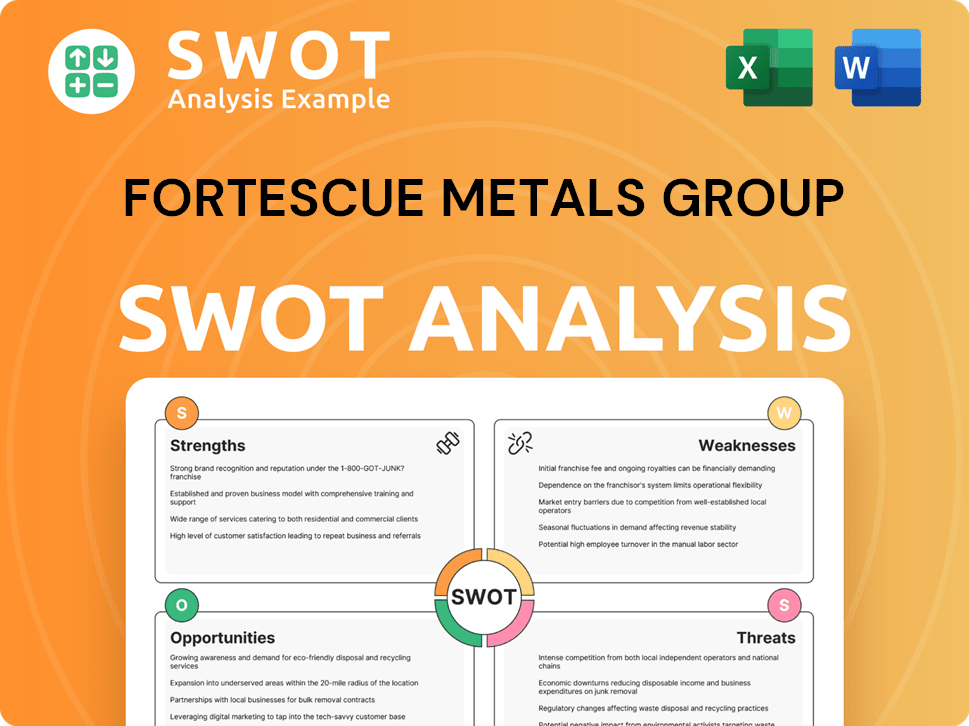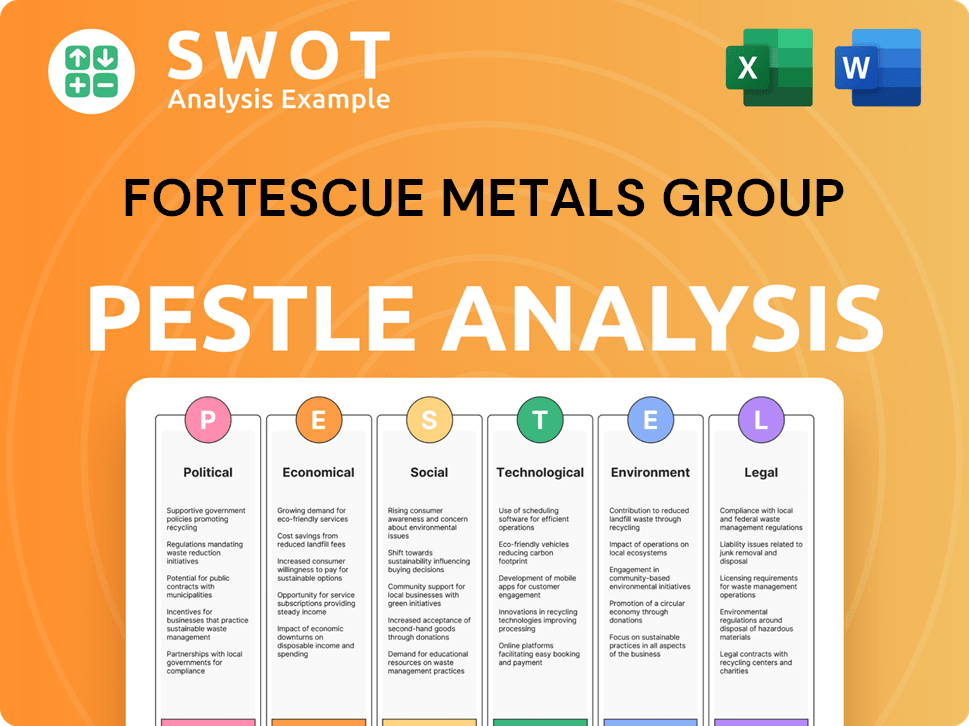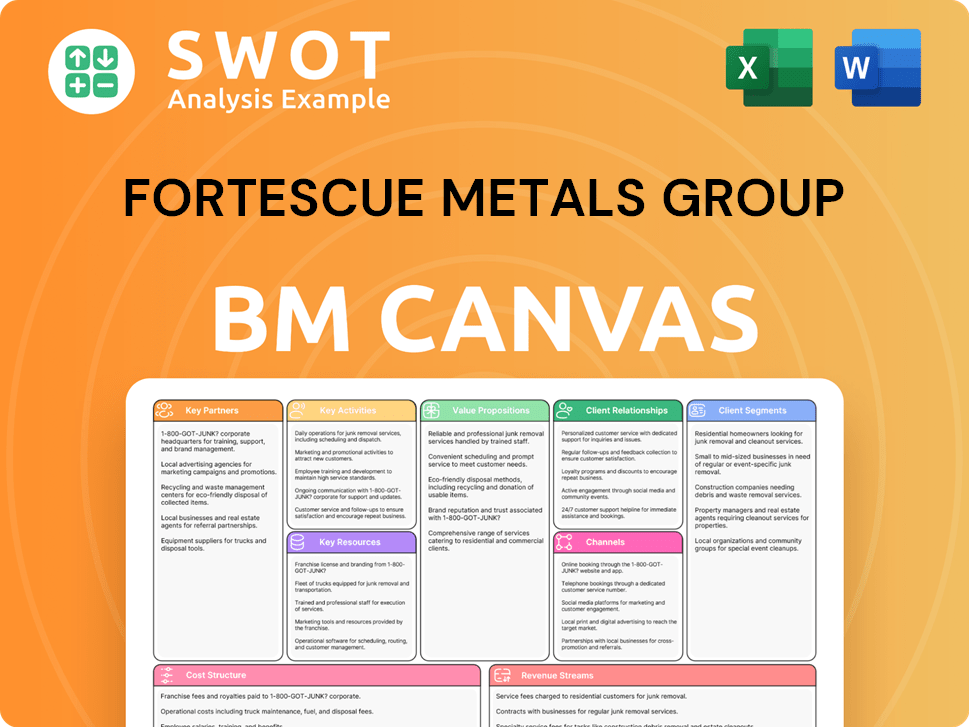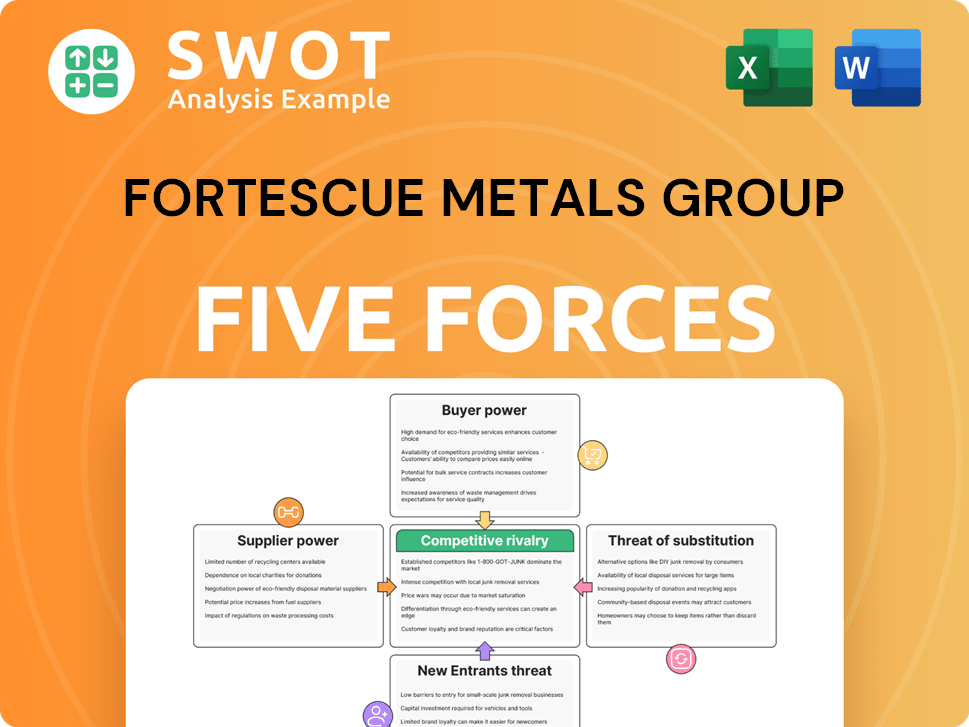Fortescue Metals Group Bundle
Who Buys Iron Ore from Fortescue Metals Group?
In the ever-shifting landscape of global commodities, understanding the "who" behind the "what" is crucial. For Fortescue Metals Group SWOT Analysis, a deep dive into its customer demographics and target market is essential for grasping its strategic positioning and future prospects. This analysis isn't just about numbers; it's about understanding the driving forces behind a global mining giant's success. Let's explore the core of FMG's customer base.

This exploration into Fortescue Metals Group's customer demographics and target market provides critical insights for investors, analysts, and anyone interested in the mining industry. We'll dissect FMG's customer profile, examining geographic locations, industry focus, and evolving needs. This detailed market segmentation analysis will reveal how FMG adapts its strategies, including customer acquisition, to thrive in a dynamic global economy. Understanding FMG's customer behavior is key.
Who Are Fortescue Metals Group’s Main Customers?
The primary customer segments for Fortescue Metals Group (FMG) are global steel manufacturers. This Business-to-Business (B2B) model focuses on large industrial corporations that require iron ore for steel production. Understanding the customer demographics is crucial for FMG's strategic planning.
Unlike businesses that sell directly to consumers, FMG's customer base is relatively small, consisting of high-volume buyers. The focus is on operational scale, production capacity, geographic location, and strategic goals of these steel manufacturers. This Growth Strategy of Fortescue Metals Group relies heavily on these key relationships.
The majority of FMG's revenue consistently comes from steel manufacturers, particularly those in East Asia. This geographic concentration highlights the importance of understanding the specific needs and market dynamics within this region. FMG's target market analysis is therefore heavily influenced by the steel industry's global landscape.
FMG's customer profile is primarily defined by the operational scale and production capacity of steel manufacturers. These are large industrial entities, not individual consumers. Their geographic location, especially in East Asia, significantly impacts FMG's market segmentation. The strategic objectives of these manufacturers, such as adopting sustainable practices, also influence FMG's offerings.
East Asia represents a significant portion of FMG's target market, reflecting the high demand for iron ore in this region. This focus is driven by the concentration of steel production capacity in countries like China, Japan, and South Korea. FMG's marketing strategy target audience is therefore heavily concentrated in these key markets.
With the growing emphasis on decarbonization, FMG is exploring new markets. This includes a shift towards higher-grade iron ore products and potential future markets for green iron and hydrogen. FMG's customer acquisition efforts are now also targeting companies seeking cleaner energy solutions. This evolution is driven by market research indicating a growing demand for sustainable practices.
Fortescue Future Industries (FFI) is a key component of FMG's strategy to serve customers seeking cleaner energy solutions and green industrial products. This expansion is in response to external trends related to climate change and regulatory pressures. The company is actively pursuing these new segments to ensure long-term sustainability.
FMG's target market characteristics are primarily defined by the operational needs of steel manufacturers. These customers require large volumes of iron ore and are located in regions with significant steel production capacity. The needs of FMG's customers are centered on reliable supply, competitive pricing, and increasingly, sustainable sourcing practices.
- Large industrial corporations
- High-volume buyers
- Geographic concentration in East Asia
- Increasing demand for sustainable products
Fortescue Metals Group SWOT Analysis
- Complete SWOT Breakdown
- Fully Customizable
- Editable in Excel & Word
- Professional Formatting
- Investor-Ready Format

What Do Fortescue Metals Group’s Customers Want?
Understanding the customer needs and preferences is crucial for any company, and for Fortescue Metals Group (FMG), this involves a deep dive into its customer demographics and target market analysis. FMG's primary customers are global steel manufacturers, whose needs drive the company's operational and strategic decisions. These customers' preferences and behaviors shape FMG's market segmentation and overall business strategy.
The core of FMG's customer relationships centers on delivering high-quality iron ore consistently and reliably. This reliability is essential for steel mills operating continuously. FMG's ability to meet these needs directly influences its customer acquisition and retention strategies. The company's focus on supply chain stability and product quality helps to address common pain points within the mining industry.
FMG's customer base is primarily composed of large steel manufacturers located in Asia, particularly China, which accounted for a significant portion of its sales. The company's marketing strategy is therefore heavily geared toward maintaining and strengthening these relationships. The company's strategic investments, such as the development of green hydrogen and green iron through Fortescue Future Industries (FFI), reflect a proactive approach to meeting evolving customer needs, especially those related to sustainability.
Customers require consistent supply, high-quality products, competitive pricing, and reliable logistics. These needs are central to their purchasing decisions.
Purchasing is driven by long-term supply contracts, negotiated directly with FMG. This ensures a steady stream of revenue and a stable customer base.
The iron content of the ore, impurity levels, and overall cost-effectiveness of the delivered product significantly influence customer decisions. Quality and cost are paramount.
Steel mills operate continuously, requiring a steady flow of raw materials. This continuous demand drives FMG's production and supply strategies.
Trust, demonstrated reliability, and the ability to meet specific product specifications build customer loyalty. Consistent performance is key.
Customers seek supply chain stability to avoid production halts. This assurance is a crucial factor in their decision-making process.
FMG's operational infrastructure and quality control measures are designed to address supply chain disruptions and inconsistent product quality. This proactive approach helps maintain customer satisfaction and loyalty. The company's focus on sustainability, through initiatives like Fortescue Future Industries (FFI), is a direct response to the evolving needs of its customers, particularly those seeking to reduce their carbon footprint. For example, FFI's projects, such as the Gladstone Green Hydrogen project, are tailored to meet the demands of heavy industry customers looking for sustainable solutions. FMG's commitment to innovation and sustainability is further detailed in an article discussing the Growth Strategy of Fortescue Metals Group.
- Supply Chain Stability: FMG's robust logistics and supply chain management ensure a consistent flow of iron ore to its customers, crucial for continuous steel production.
- Product Quality: Stringent quality control measures guarantee that the iron ore meets the precise specifications required by steel mills, improving the efficiency and quality of steel production.
- Sustainability Initiatives: FMG's investments in green hydrogen and green iron aim to reduce the carbon footprint of its customers, aligning with global trends towards decarbonization.
- Customer Feedback Integration: FMG actively incorporates customer feedback and market trends into its product development and strategic planning, ensuring its offerings remain relevant and competitive.
Fortescue Metals Group PESTLE Analysis
- Covers All 6 PESTLE Categories
- No Research Needed – Save Hours of Work
- Built by Experts, Trusted by Consultants
- Instant Download, Ready to Use
- 100% Editable, Fully Customizable

Where does Fortescue Metals Group operate?
The geographical market presence of Fortescue Metals Group (FMG) is largely concentrated in East Asia, with China being its primary market. This strategic focus is driven by the high demand for iron ore in the steel-producing sector. FMG's operations are heavily geared towards supplying iron ore to major steel mills in this region, establishing a strong foothold in a market critical to its financial performance.
Besides China, FMG also targets Japan and South Korea, which are significant consumers of iron ore. These markets are crucial for maintaining a diversified customer base and reducing reliance on any single region. The company's presence in these countries is supported by its robust supply chain and logistics network, ensuring that iron ore is delivered efficiently to these key Asian economies.
FMG's market segmentation strategy involves understanding the specific needs of each region. This includes adapting to varying requirements for iron ore grades and delivery logistics. For instance, the Chinese market, due to its large scale and diverse production methods, requires flexibility in terms of iron content and impurity levels. FMG addresses these differences through its sales and logistics operations, tailoring contract terms to regional dynamics.
China is the largest consumer of FMG's iron ore. In recent years, China has accounted for a significant portion of FMG's revenue, reflecting the country's substantial steel production capacity and demand. This dominance highlights the importance of the Chinese market to FMG's overall financial health.
FMG has a strong market share in key Asian markets, particularly in Japan and South Korea. These markets are critical for revenue diversification. The company's consistent supply of iron ore from the Pilbara region contributes to its strong brand recognition in these Asian markets.
FMG's logistics operations are crucial for ensuring efficient delivery to major ports in East Asia. The company's ability to manage its supply chain effectively is a key factor in maintaining its market position. Efficient delivery is essential for meeting the demands of steel mills.
FMG's customer engagement involves understanding local regulatory environments and industrial practices. This approach allows the company to tailor its offerings to meet the specific needs of each market. Building strong customer relationships is key to long-term success.
FMG's expansion into green energy projects, through Fortescue Future Industries (FFI), indicates a strategic move into new geographic areas. This includes potential hydrogen production facilities in North America and Europe. This expansion reflects an analysis of the geographic distribution of future growth opportunities in the green economy, diversifying its traditional iron ore export markets. The Marketing Strategy of Fortescue Metals Group also highlights FMG's strategic approach to market expansion.
Fortescue Metals Group Business Model Canvas
- Complete 9-Block Business Model Canvas
- Effortlessly Communicate Your Business Strategy
- Investor-Ready BMC Format
- 100% Editable and Customizable
- Clear and Structured Layout

How Does Fortescue Metals Group Win & Keep Customers?
Customer acquisition and retention strategies for Fortescue Metals Group (FMG) are tailored for its business-to-business (B2B) model, focusing on long-term relationships. Unlike consumer-facing companies, FMG doesn't use broad marketing campaigns. Instead, it relies on direct sales and its reputation as a reliable iron ore producer. This approach is crucial for the company's success in the mining industry.
FMG's customer acquisition involves direct negotiations and participation in global commodity forums. Securing multi-year supply contracts with major steel manufacturers is a key tactic. Consistent operational performance and meeting large-volume demands are essential for attracting new clients. The company prioritizes building strong relationships with its customer base.
Customer retention at FMG is maintained through consistent product quality, reliable shipping, and transparent communication. While traditional loyalty programs aren't used, strong account management and responsive after-sales service build loyalty. Customer data and CRM systems are critical for managing large-scale relationships, tracking contract terms, and client feedback. The company's approach focuses on long-term value.
FMG acquires customers primarily through direct sales efforts. These involve face-to-face negotiations and building relationships with key decision-makers in the steel manufacturing sector. This is a core strategy for attracting new business.
FMG actively participates in global commodity forums and industry events. This allows the company to showcase its products and services, network with potential clients, and stay informed about market trends. It's a vital part of their customer acquisition strategy.
Securing multi-year supply contracts is a key sales tactic for FMG. These contracts provide stability and predictability for both FMG and its customers. They often involve direct engagement with procurement teams.
FMG ensures consistent product quality to retain customers. This includes rigorous quality control measures throughout the mining and processing stages. High-quality iron ore is essential for maintaining customer satisfaction.
FMG employs several strategies to retain its customer base. These methods focus on building strong relationships and providing excellent service. Understanding the needs of FMG's customers is critical for long-term success.
- Reliable Shipping Schedules: FMG maintains reliable shipping schedules to ensure timely delivery of iron ore.
- Transparent Communication: Transparent communication about market conditions and potential disruptions is provided.
- Strong Account Management: Strong account management and responsive after-sales service are provided.
- Customer Data and CRM: Customer data and CRM systems track contract terms, delivery schedules, and client feedback.
FMG's customer base primarily consists of major steel mills, particularly in Asia. The company's focus on long-term relationships reflects its strategic goals. For a deeper understanding of FMG's history and its journey, you can refer to the Brief History of Fortescue Metals Group.
Fortescue Metals Group Porter's Five Forces Analysis
- Covers All 5 Competitive Forces in Detail
- Structured for Consultants, Students, and Founders
- 100% Editable in Microsoft Word & Excel
- Instant Digital Download – Use Immediately
- Compatible with Mac & PC – Fully Unlocked

Related Blogs
- What are Mission Vision & Core Values of Fortescue Metals Group Company?
- What is Competitive Landscape of Fortescue Metals Group Company?
- What is Growth Strategy and Future Prospects of Fortescue Metals Group Company?
- How Does Fortescue Metals Group Company Work?
- What is Sales and Marketing Strategy of Fortescue Metals Group Company?
- What is Brief History of Fortescue Metals Group Company?
- Who Owns Fortescue Metals Group Company?
Disclaimer
All information, articles, and product details provided on this website are for general informational and educational purposes only. We do not claim any ownership over, nor do we intend to infringe upon, any trademarks, copyrights, logos, brand names, or other intellectual property mentioned or depicted on this site. Such intellectual property remains the property of its respective owners, and any references here are made solely for identification or informational purposes, without implying any affiliation, endorsement, or partnership.
We make no representations or warranties, express or implied, regarding the accuracy, completeness, or suitability of any content or products presented. Nothing on this website should be construed as legal, tax, investment, financial, medical, or other professional advice. In addition, no part of this site—including articles or product references—constitutes a solicitation, recommendation, endorsement, advertisement, or offer to buy or sell any securities, franchises, or other financial instruments, particularly in jurisdictions where such activity would be unlawful.
All content is of a general nature and may not address the specific circumstances of any individual or entity. It is not a substitute for professional advice or services. Any actions you take based on the information provided here are strictly at your own risk. You accept full responsibility for any decisions or outcomes arising from your use of this website and agree to release us from any liability in connection with your use of, or reliance upon, the content or products found herein.